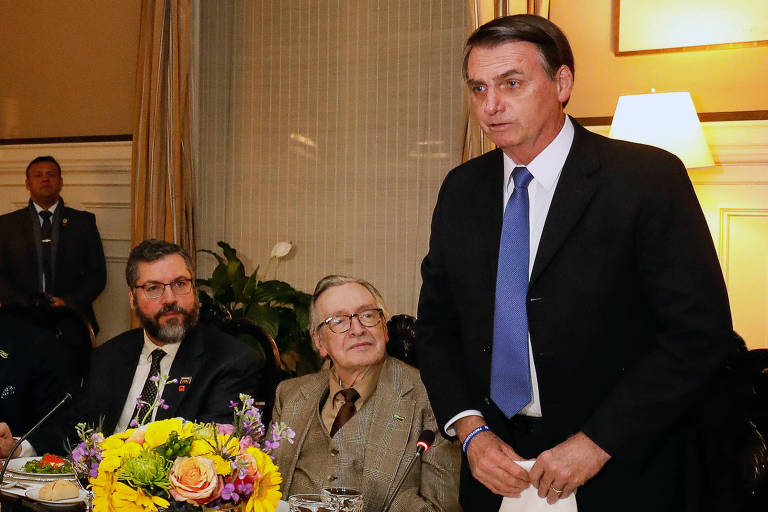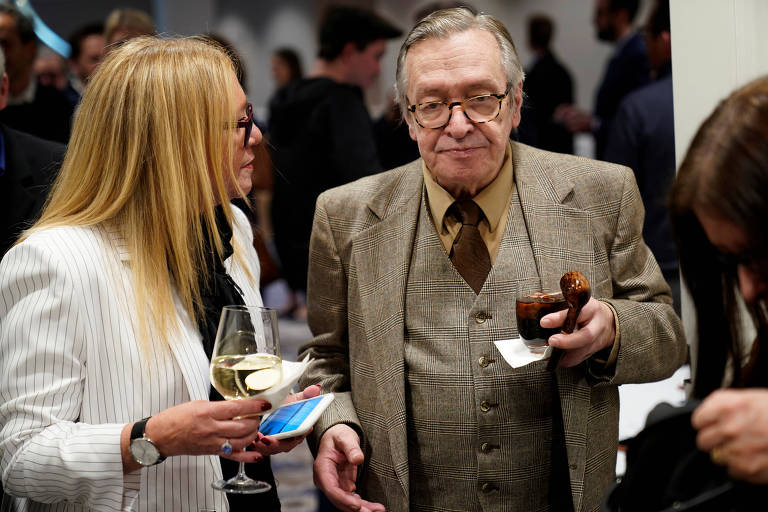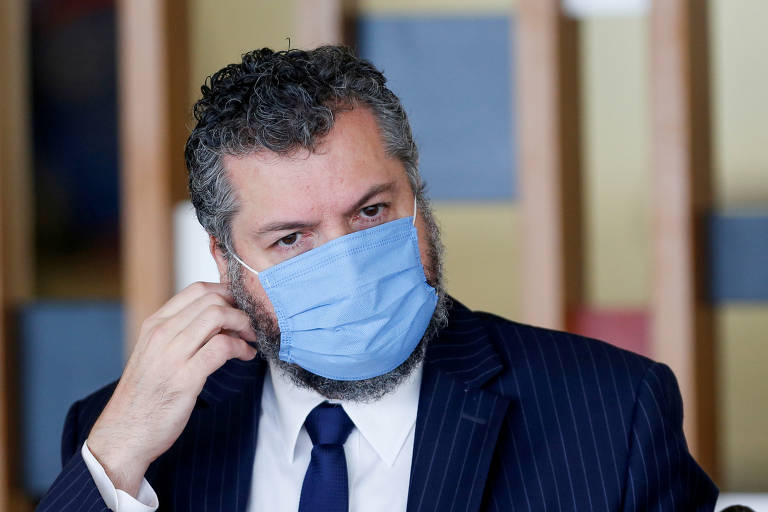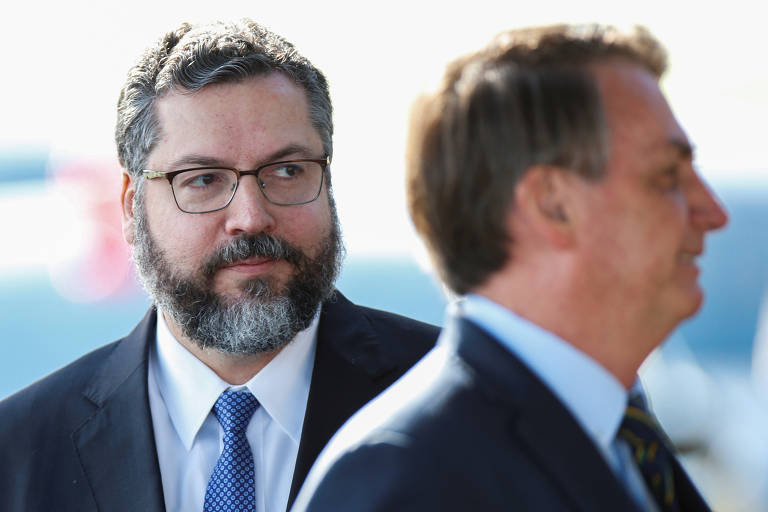Benjamin R. Teitelbaum
War for Eternity: Inside Bannon’s Far Right Circle of Global Power Brokers
Publisher: Dey Street Books, April 2020, 332 p.
ASIN: B07SD11Z2Y (Kindle Books)
Antes de transcrever o capítulo 13, alguns trechos recolhidos aleatoriamente no livro:
As fontes inspiradoras do guru presidencial, de acordo com o relato do livro de Benjamin Teitelbaum, "War for Eternity":
"René Guénon died paranoid and embroiled in conflicts with his former followers in 1951, and Julius Evola spent his last years holed up in his Rome apartment with a tiny group of exceptionally radical and dangerous followers—simple terrorists, some of them—and scorned by many Traditionalists."
Olavo recomendou o chanceler acidental ao presidente:
"Olavo offered ... Ernesto Araújo,... as foreign minister. Araújo had studied Olavo’s lectures and was a skilled writer and a scholar in his own right, who maintained a blog called Metapolítica: Contra o Globalismo (Metapolitics: Against Globalism) and could discuss the works of Guénon and Evola fluently. More so than Olavo himself, Ernesto was a Traditionalist. In 2017 he penned an academic essay, “Trump and the West,” that referenced Evola’s Metaphysics of War."
Depois, ele veio a chamar ambos de loucos, como figura mais adiante no livro:
"Steve asked him about Guénon. “He was crazy,” Olavo said. “He said a lot of crazy things. But”—and Olavo turned straight to me for the first time during the dinner and peered over his glasses while pointing his finger—“he said a lot of true things as well.” What about Evola? I asked. “Evola was completely insane. He wanted to bring down the church so that he could create a new European paganism. Ha! But he is so fun to read. His book on alchemy was great. They all could write beautifully. No atheist could write as beautifully as they could.”
Benjamin R. Teitelbaum
War for Eternity: Inside Bannon’s Far Right Circle of Global Power Brokers
Publisher: Dey Street Books, April 2020, 332 p.
ASIN: B07SD11Z2Y (Kindle Books)
Dinner at the Embassy
Capítulo 13, pp. 131-137
I ARRIVED LATE, A LITTLE BEFORE FIVE IN THE EVENING, delayed during my walk from the train station by hordes of youths in MAGA hats and their clerical chaperones who had swarmed downtown Washington, D.C., for the anti-abortion March for Life in January 2018. As I turned the corner and walked up the sidewalk toward the townhouse, I saw Andy Badolato standing outside berating someone on his cell phone, sweating robustly while wearing shorts and a polo shirt in the 30-degree air. He was there to receive me. Steve knew I was coming and had asked his most notorious fixer to park me in the ground level of what he still calls “the Breitbart embassy.”
Like a cruise liner, Steve Bannon’s Washington townhome goes from stark to gaudy as you ascend floors. You enter the first floor into a dimly lit TV den with low ceilings and a large worn leather couch flanked by a steel table and chairs that look like they were taken from a 1990s sports bar—a space that is part run-down bachelor pad, part war room. As you move farther into the house, French doors open onto a conference room overflowing with papers and laptops, all facing a mounted monitor on the wall and a poster of D.C. that one could easily mistake for a target map.
I sank into the couch and got comfortable. I’d been through the routine plenty of times before, and had come to suspect that the waiting exercise was a deliberate strategy to humble me ahead of a meeting. Meanwhile, Andy was on and off the phone, a bottle of beer in his hand. He segued from making a business pitch to a lawyer to a conversation with someone interested in Trump’s famed border wall with Mexico (was this a business pitch, too?).
After more than an hour, I was summoned. “Dinner party is starting, boss wants you upstairs.” Steve greeted me with a handshake and a hug as I entered. “Welcome, Ben.” The walls of the second floor are painted with pastel scenes from Greek antiquity, while the carpeting—royal blue with white stars—says home. A dozen other guests trickled in and mingled with Steve in front of a minibar. Darren Beattie, a former speechwriter for Trump recently fired for presenting at a conference sponsored by the controversial H. L. Mencken Club years earlier, made a quiet entrance. The other attendees were Brazilians.
Then the main attraction entered, the guest in whose honor Steve had arranged the dinner. Everyone made space and broke out in cheers as he and Steve walked across the room to greet each other. One of the younger Brazilians standing next to me was fighting back tears. With smiles and laughs we made our way to the long, impressively laden table. We sat down and said grace, reciting the Lord’s Prayer with our heads bowed, as is the routine for the Brazilian guest. Of course I joined them in this.
The mood wouldn’t become jovial again until, after a few minutes, a middle-aged Brazilian investment banker named Gerald Brant tapped his glass and proposed a toast: “This is a dream come true,” he said. “Trump is in the White House, Bolsonaro is in Brasília. And here we are in Washington: Bannon and Olavo de Carvalho, face-to-face. This is a new world, friends!”
I knew Traditionalism had motivated Bannon to connect with one other power broker—Aleksandr Dugin. But the story had grown more complex, for here was another major global Traditionalist. I had asked Steve on multiple occasions if he could help me reach Olavo, or if I could sit in on one of their meetings, and he had always been evasive—until now.
Following the October 28, 2018, elections in Brazil, the new president, Jair Bolsonaro, had offered Olavo the position of minister of education. Olavo declined, citing his desire to continue writing and agitating freely from his social media throne. The former muqqadam in Frithjof Schuon’s tariqa would be serving as an adviser to the president nonetheless, everyone knew, while remaining situated at his home in rural Virginia, where he had lived without returning to Brazil for over a decade.
As is proper, however, Olavo made recommendations as to those the president might consider instead for government positions. Cultural funding and universities would be key targets of reform, so Olavo understood that the future minister of education would need robust credentials and a passion for, as he saw it, fighting against Marxist infiltration. He recommended Ricardo Vélez Rodríguez, a conservative philosopher. And while making that recommendation, Olavo offered a second: Ernesto Araújo, perhaps as foreign minister. Araújo had studied Olavo’s lectures and was a skilled writer and a scholar in his own right, who maintained a blog called Metapolítica: Contra o Globalismo (Metapolitics: Against Globalism) and could discuss the works of Guénon and Evola fluently. More so than Olavo himself, Ernesto was a Traditionalist. In 2017 he penned an academic essay, “Trump and the West,” that referenced Evola’s Metaphysics of War.
* * *
STEVE SAT ME across from Olavo at the dinner table, with himself at the head. Darren Beattie was to my left, and in between toasts and monologues, he and I chatted about philosophy and academia. Beattie received a round of praise during the meal after Steve said that he had played a key role in writing a speech President Trump delivered in Warsaw in July 2017, which celebrated Poland and America as members of a cultural and political union of the West. “We write symphonies. We pursue innovation. We celebrate our ancient heroes, embrace our timeless traditions and customs” were some of its key lines, as well as the charge that “our own fight for the West does not begin on the battlefield—it begins with our minds, our wills, and our souls.” Beattie later told me he wasn’t in fact one of the lead writers on the speech, but so as not to cause embarrassment, he nodded in thanks.
We talked a lot about Bolsonaro. Some of the Brazilians seemed to have come to the dinner with the agenda in mind of selling the new administration to Steve. Olavo and a handful of the others had been to the U.S. State Department earlier in the day for what appeared to have been part of an official visit, and a puzzling one at that: neither Olavo nor anyone in his immediate entourage held official positions in the Bolsonaro government. Olavo was there to voice his condemnation of China and the urgency of resisting the spread of its influence globally: unlike Aleksandr Dugin, Olavo was a stalwart Traditionalist ally of Steve’s in this regard. The officials at the State Department had seemed to agree with this assessment of China, much to the Brazilians’ surprise.
Steve didn’t seem as surprised as they were. Meanwhile, he wanted to know more about the composition of the Bolsonaro government. Olavo and Gerald Brant took turns describing the new administration as factionalized.
Regrettably it contained elements of the old military guard, who were often the target of Olavo’s screeds on corruption, but at least all parties involved seemed serious about establishing law and order in Brazil. There were the free-market capitalists, represented by Bolsonaro’s minister of finance, Paulo Guedes, who was educated at the University of Chicago. He opposed socialism—that was good—but he seemed like a globalist. This made him unlike the final pillar: the patriots, the nationalists, personified by Olavo and Bolsonaro’s sons—none of whom had official positions in the administration, but were instead confidants of the president with massive social media followings. Steve asked about this faction’s vision, and the Brazilians around the table seemed to reply in unison, “Alignment with the Judeo-Christian West.”
Olavo was in direct contact with the president, he affirmed. They spoke most recently about China and about CNN, which had established itself in Brazil for the purpose, he thought, of contesting the messaging machine of the new president. His conversation with Bolsonaro left Olavo concerned that the new president didn’t see the threat CNN posed to his government. But the Chinese threat and the need for Brazil to reorient itself toward the United States—that Bolsonaro understood well, if only for economic reasons.
Steve was thrilled to hear that. Brazil had long been grouped together with Russia, India, and China in the so-called BRIC alliance of powerful, non-NATO-allied ascendant economies. Isolating China by undoing that alliance was appealing enough, but as Steve once argued to me, Brazil has hidden metaphysical gifts to offer the United States as well. Not only does the Judeo-Christian West exist in South America through Brazil, but Brazil began the process of modernization later than Western Europe and the United States. That means that its authentic Western culture runs deeper, is less corrupted. It can serve as a reserve of culture that nations further deteriorated by modernity embrace as they strive to revitalize themselves.
Steve didn’t go there this evening. Instead, he stuck to practical issues as the conversation got more serious. He shared Olavo’s belief that mainstream education in the West was destroying its potential for a conservative future, and that alternative education systems were needed as a countermeasure. He had been working on a solution.
In 2009, at his then new home in rural Virginia, Olavo launched Seminário de Filosofia. It was an online school, a way for him to make use of his years of lecture notes from Brazil now that he lived abroad. A standard university position would not have appealed to him anyway. He felt leftists had infiltrated Brazil’s educational system in preparation for a communist revolution. Conservative ideas could be introduced into society only through alternative channels at this point—metapolitics, that’s what was needed—and the internet provided the ideal venue. Seminário de Filosofia was not designed for students to ever meet with Olavo face-toface.
Instead their tuition provided them with access to a series of video lectures, the broad topics being comparative religion, letters and arts, human and natural sciences, and communication and expression. Enrollment would eventually swell to over two thousand students, most of them young men.
Steve wanted to achieve a similar level of outreach. After all, he, too, had plans to develop a school for the implicit purpose of waging metapolitics. But Olavo was quick to distinguish himself. He had taught the masses, but he wasn’t into creating templates; he focused on the individual. He said he wanted to know where each student was and to help his pupils understand what they wanted. How he could do this with so many students at once? I was curious to know. As I listened, I wanted to ask Olavo whether it was a coincidence that someone who opposed globalism also disapproved of universal educational models that didn’t address the particular student.
I never got a chance to ask because the conversation took a quick turn. Olavo’s school was a philosophy school, and he said his definition of philosophy was the attempt at aligning the unity of knowledge with the unity of consciousness. This meant he was interested in understanding the limits of knowledge a person had. It was a bit arcane—I didn’t get it, and I don’t think others at the table did, either. But I remember thinking that Olavo indicated he defined a person by what he or she knows. People are knowledge. When you change, it is because you learned something. Steve, in host mode, was acting agreeable, but I knew he disagreed with this. He thought that we possessed “being” beyond knowledge; indeed, that our economy and society is flawed because it only values people based on their intellect. When your life changes genuinely, he thinks, it is because you’ve had a change in being. This is why Steve loves the movie Groundhog Day.
Steve asked him about Guénon. “He was crazy,” Olavo said. “He said a lot of crazy things. But”—and Olavo turned straight to me for the first time during the dinner and peered over his glasses while pointing his finger—“he said a lot of true things as well.” What about Evola? I asked. “Evola was completely insane. He wanted to bring down the church so that he could create a new European paganism. Ha! But he is so fun to read. His book on alchemy was great. They all could write beautifully. No atheist could write as beautifully as they could.”
I asked him if it was a coincidence that both he and Bannon had gained influence, and that both considered themselves affiliated in some way with Traditionalists. “No,” he replied. “Because the Traditionalists put forth a criticism of science, modern science.” I found it a puzzling response. They were both gurus behind major populist revolts. Was that really about criticizing science? Steve did question the reality of global warming, but he didn’t present himself as an opponent of modern science. And why did Olavo seem so eager to downplay his affiliation with Traditionalism and then go on to praise its key thinkers? What had happened since his time in Schuon’s tariqa?
Those were questions I would have to get to later. Steve speedily wrapped up the dinner and we bid each other farewell. I left wondering where his and Olavo’s relationship was headed. Steve maintained a plethora of political partnerships—some shallow, some substantial—throughout the global radical right. But compared even with his connections with close allies like Brexiter Nigel Farage, his commonalities with figures like Aleksandr Dugin and Olavo de Carvalho ran deep and must have felt exceptional. They were political and spiritual kin, and they were only beginning to interact now.
* * *
ABOUT TWO MONTHS LATER, I saw images splashed across U.S. media showing Steve sitting once more at a lavish dinner in Washington, D.C.— across town this time, at the residence of the Brazilian ambassador on Massachusetts Avenue. To Steve’s left sat President Bolsonaro. To Bolsonaro’s left sat Olavo de Carvalho. And to Olavo’s left sat Brazil’s foreign minister, Ernesto Araújo. The president was making his first visit to a foreign government, and breaking with convention in the process.
Typically, this first foreign visit takes place in Buenos Aires. But Bolsonaro wanted to signal to the world that Brazil’s foreign policy was changing.
His decision to invite Steve to the dinner was also provocative. Steve no longer held any official position in the White House or in the government. Not only that—Trump’s most recent public comments on “Sloppy Steve,” as he had taken to calling him, were fiercely critical. The guest list at the embassy thus testified to Steve’s continued high status in the eyes of the Brazilian government but also Bolsonaro’s confidence in his relationship with Trump. He adored the U.S. president, hardly ever missed an opportunity to praise him on social media, and would greet him the next day at the White House with a Brazilian soccer jersey emblazoned with the Trump name.
The purpose of the visit was more than trading pleasantries, however. Bolsonaro and Trump hoped to discuss trade deals, the imperiled anti-American government in Venezuela, perhaps even the possibility of basing a U.S. rocket-launching station in Brazil, though all these were just elements of the bigger message: Bolsonaro was there to tell Trump he wanted a greater U.S. presence in Brazil. Implicitly, this also meant that he wanted to loosen the Chinese grip on his country and its economy. It marked the advance of an agenda from the nationalist faction of his administration, the wing driven by Olavo, the complicated Traditionalist who was striving to see Brazil shed its mercantilist geopolitics that linked it to China, and instead prioritize the spiritual roots that made it a part of the Judeo-Christian West.
It was part of the Traditionalist-inspired vision that united Olavo and Bannon, now in action.
Fim do capítulo: pp. 131-137.





